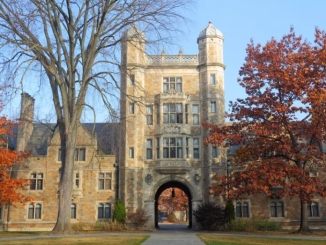
The Idaho State Board of Education voted Wednesday to ban offices, centers and policies “dedicated to DEI activities” at public four-year colleges.
The move to abolish diversity, equity and inclusion initiatives comes amid a national backlash against racial preferences favoring underrepresented minorities in higher education hiring, promotions and student admissions.
Meeting in Boise, the eight-member board unanimously approved a resolution to affirm an Idaho law “prohibiting diversity statements in hiring and admissions decisions” and confirm the state’s accreditor “does not require specific structures or activities related to DEI” at public campuses.
{snip}
The resolution defines DEI as any approach that prioritizes personal identity characteristics over individual merit. The state’s public colleges, which serve 54,000 students, must comply with the resolution by June 30.
“We are disappointed but not surprised that it’s come to this, given what’s happened in other states,” said C. Scott Green, president of the flagship University of Idaho.
Mr. Green said the resolution would affect his campus because DEI policies have improved overall graduation rates, but pledged to uphold the law.
Other Idaho college presidents attending the meeting, including Cynthia Pemberton of Lewis-Clark State College and Marlene Tromp of Boise State, said the resolution would not affect their programs.
{snip}
“We remain committed to making sure that every student knows Boise State is their home,” Ms. Tromp said.
Joshua Whitworth, executive director of the board, said an extensive consultation with state lawmakers, faculty and students yielded criticisms of “DEI ideology” on both sides of the issue, although a strong majority appeared to favor keeping the diversity and other programs in place.
Mr. Whitworth acknowledged that roughly 80% of 687 student comments opposed the resolution, compared with just 10% who supported it and 9% who were “not interested.”
“These are hard discussions,” Mr. Whitworth said.
Board member Kurt Liebich voiced doubts about the resolution’s “unintended consequences.”
He said that while DEI implementation has “caused real problems” at Harvard and the University of Michigan, he hadn’t seen the same problems in Idaho.
{snip}
“I don’t know when ’inclusion’ became a four-letter word,” Mr. Liebich said, “but don’t we want every student to show up on our campus and feel like they are included and belong?”
TJ Bliss, the board’s chief academic officer, said a legal analysis showed the resolution “does not prohibit” assistance to American Indian, first-generation, low-income, veteran or disabled students. Nevertheless, Samuel N. Penney, a member of the Nez Perce Tribal Executive Committee, objected to the policy.
“Although we appreciate that assurance, we are concerned that the language of the resolution does not specifically exempt Native American programs,” Mr. Penney said during public comments before the vote.
Some Idaho universities have already moved to redirect DEI funding to broader student “success centers,” acting on recent policy changes.
Idaho State President Robert Wagner said his administration reallocated diversity and gender resources last month to help student clubs lead and administer activities that make minorities feel welcome on campus.
“It’s not ’doing away with.’ It is moving,” Mr. Wagner said.
{snip}
In March, Republican Gov. Brad Little signed a law banning diversity statements in hiring and admissions.
Over the past year, resistance to DEI policies has mounted nationwide, particularly in conservative states. Academics interviewed by The Washington Times noted that the Idaho resolution follows similar policy changes in Texas and Florida and at dozens of universities.
Some DEI advocates cited a Supreme Court ruling that overturned affirmative action in college admissions last year and President-elect Donald Trump’s victory in November’s election as factors in the recent pushback.
“Whiteness wants its country back,” said Omekongo Dibinga, a professor of intercultural communications affiliated with the Antiracist Research and Policy Center at American University. “Nothing more to it. So-called leaders see Trump’s election as an opportunity to either get rid of inclusive programs or kiss the ring to avoid being targeted.”
* Original Article:
https://www.washingtontimes.com/news/2024/dec/18/idaho-education-board-abolishes-dei-ideology-publi/?utm_source=smartnews.com&utm_medium=smartnews&utm_campaign=smartnews%20


